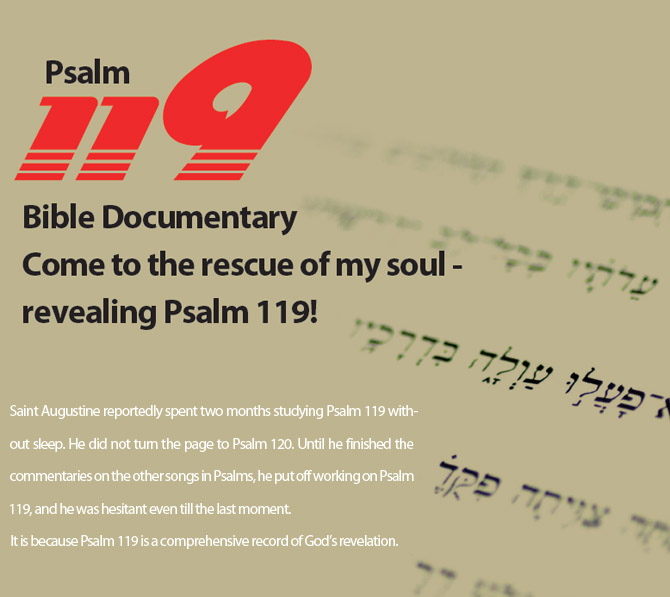|
Bible Documentary Come to the rescue of my soul - revealing Psalm 119!
|
|
|
글쓴이 :
관리자
|
|

God’s special care, the structure of Psalm 119
Psalm 119 has an orderly and profound structure. In its contents and composition, it is deemed as the most excellent song in the book of Psalm.
■ It is composed of total 176 verses, and it is the longest chapter in the Bible, the Old and New Testament combined.
■ It is positioned in the very center of the Old and New Testament.
■ Each verse is independent and complete.
■ It is consists of 22 stanzas following the order of the Hebrew alphabet (22 of them). Each stanza is perfectly fitted with 8 verses ? just like the “ABC song.”
Reading Psalm 119, we can feel God’s heart to make it friendlier and easier for the Israelites to sing it along.
Psalm 119 is the Ten Commandments.
Psalm 119 is called as ‘the New Testament inside the Old Testament’ because it focuses on the Words of God, instead of having God directly appearing in it. The ten Hebrew words are used exchangeably with the word ‘Word’ and appear in each verse more than one time without exception. (The only exception is verse 122.) The ten Hebrew words are translated as ‘commandment,’ ‘law,’ ‘testimony,’ and so on. What is noteworthy is its link with the Ten Commandments. The Ten Commandments God gave to Moses means ‘Ten Words’ in original Hebrew. The doctrine of the Ten Commandments is identical to the words spoken in Psalm119, the doctrine of the commandments.
 1. Torah (God’s Law, Law) 1. Torah (God’s Law, Law)
* Number of times recorded: 25 times (This is based on the Hebrew word occurrence; please refer to the sermon for reference verses in Psalm 119)
* Origin and Definition: It is derived from the Hebrew verb “Yarah,” meaning “to throw,” “to cast an arrow.” It describes a motion of pointing with the hands. And that definition was expanded to mean teaching, instruction, or law. God’s Words are His guidelines for us to point to the road we should take. Torah is used most frequently to mean law. The word emphasizes that the law must be obeyed, as law itself is the statue and revelation.
2. Eduth, edah (Lord’s testimony, Jehovah’s proof)
* Number of times recorded: 25 times
* Origin and Definition: the word was derived from the Hebrew word “Uth.” Primarily it means to “to surround.” Further it means “to warn,” “advise,” or “to have as witness.” In Deuteronomy 4:26 Moses called heaven and earth as witnesses.
3. Mishpat (Judgment, ordinance)
* Number of times recorded: 23 times
* Origin and Definition: the word is derived from the verb “shaphat,” meaning “to give trial,” “to govern.” It means “trial,” “judgment,” or “punishment.” In Exodus 21-23 the provisions of laws from the covenant are presented. The laws became regulations for Israel later. Such precedence became Israel’s code of conduct and ordinance.
4. Hoq (Statutes)
* Number of times recorded: 21 times
* Origin and Definition: the word was derived from “haqaq,” meaning “to settle definitely,” “something that is firm.” In ancient Near East, laws were inscribed on stones or stone tablets and those stones were placed in public places. As such, Hoq emphasizes the legal binding force and the eternity of the Words of the Bible and God’s laws.
5. Dabar (God’s Word)
* Number of times recorded: 23 times
* Origin and Definition: it was derived from the verb “dabar,” meaning “to speak.” It means “word,” “command.” This shows that God of Israel is God who speaks. Exodus and Deuteronomy used this word to refer to the Ten Commandments.
6. Piqqud (Percepts of the Lord)
* Number of times recorded: 21 times
* Origin and Definition: it was derived from “Paqad,” meaning to “meet,” “investigate,” and ” punish.” It means “command,” “percept,” and “instruction.” As stewards or managers carefully observe things to complete their duties and take preemptive measures, this word teaches us that we need to observe God’s law meticulously.
7. Mitsvah (Commandments of the Lord)
* Number of times recorded: 22 times
* Origin and Definition: the word is derived from the verb “Savar,” meaning “to give order,” “to set,” “to appoint.” The word emphasizes the authority of God’s Words. This implies that God is the one with the authority to make such commandments, rather than emphasizing the authority of the commandments.
8. Derek (Deeds, the way, journey)
* Number of times recorded: 13 times
* Origin and Definition: It is derived from the verb “darak,” meaning “to step on,” “to go on a way.” A way of one’s life is a spiritual journey. In other words, everyone goes on the pilgrim’s way. Whether pilgrims success or not depends on how well they observed the articles of covenant, whether they always remembered God and His love for redemption, and how much thanksgiving they gave to Him.
9. Imrah (God’s Words, promise)
* Number of times recorded: 19 times
* Origin and Definition: It is derived from “amar,” meaning to “say,” “indicate,” “affirm,” “command,” and “declare.” The word was used mainly in the declaration of the judgment to Sodom and Gomorrah.
10. Emet (Truth)
* Number of times recorded: 5 times
* Origin and Definition: It is derived from “aman,” meaning to “set,” “trust,” and “verify.” The word “Amen” we use during worship service was derived from “aman.”
The fact that “emet” was used to refer to laws and Words shows that God’s Word is true and not false. Furthermore, it implies that God’s law and Word is sincere, valid, and firm enough for people to rely on it, even with risking their lives for it.
In other words, the conclusion of Psalm119 is ‘Word of God.’ God’s Word is the truth from the beginning of time. It is perfect, pure, eternal and a source of life. So human being can gain life if they keep living according to the Word.
The Ten Commandments are not the rules that restrict and bind humankind. Rather, they are deeply rooted in the lives of God’s people. They show love, trust, reliance, and obedience that become foundation of faith.
In keeping all of these laws, the people of God learn the rules of truth as in how to serve, trust, and obey God’s Will as they live in the world.
Through the long song that consists of 176 verses, and using the characteristic rhythm like the ‘ABC Song,’ God is anxiously giving His message: “Please live according to God’s Word, and you will be blessed and given life!” to His People in Psalm 119.
On our ways as pilgrims in this world, when we are faced with tribulation, affliction, stumbling block, wandering, and various threats, let us call emergency number 119 to the rescue of our spirits! Let us have the wisdom to turn to Psalm 119 and rely on the help of the Word of the omniscient and omnipotent God.

Written by Reporter Ji Keun-wook
(This article is a summary of the sermon “The sum of Your Word is truth” (Psalm 119:160) on September 24, 2012.)
|
|

